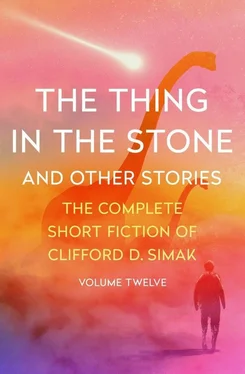He tried to imagine how it might have been in those days when the rivers ran dirty to the sea and the sea itself was foul, when the air and earth were poisoned and a great noise beat against the land.
The world in which he sat, he thought, had begun to form with the first pollution-killed fish that floated to the surface, with the temperature inversion that had blanketed a city with the smog that it had spawned, with the cry of rage that had gone up against the smoking chimneys and the streams of effluents that were poured into the waters. We must build new cities, men had screamed, and the new cities had been built, but not quite the kind the screamers had envisioned; we must halt the overuse of resources, other men had shouted, and in time the old, time-honored rule of obsolescence had been scrapped and commodities had been built to last—not for ten years or twenty, but for centuries. As a result of this, in time fewer commodities were manufactured and the use of natural resources and energy had diminished and there had been less and less pollution and today the rivers ran crystal to the sea and the air was clean and fresh and the land lay quite unpoisoned since agriculture had been moved indoors and no longer utilized the soil
A city, he thought. Once a sprawling mass of structures, today three great towers: one for residential purposes, another for agriculture and industry the third for services—for government, education, arts and sciences, recreation. Three great towers reaching deep into the earth, rearing far into the air, and all operated by electronic wizardry. A people served by cybernetic systems that turned bleak corridors into country lanes, that gave a man an authentic simulation of every possible environment, that did one’s chores and wiped one’s nose and helped to do one’s thinking and placed at each man’s fingertips all the knowledge in the world.
And all of this, he thought, because a crackpot (the first of many crackpots) a bit more than two hundred years ago had bellowed out a maniac conviction that the earth was being poisoned.
From that first crackpot to this, so small a thing to bring about so great a change.
And that was why, he told himself, he must be absolutely certain.
He rose from his chair and went to the console, lifted the think-piece from its cradle and put it on his head. Sitting down in the operator’s chair, he punched in the gross knowledge components, then fed in the factors. He had done it all before, he told himself; he would do it all again. It was not necessary, he was sure; he already knew. But in a thing like this nothing must be left undone.
It was all imagination, of course, but he seemed to see and be aware of, as had happened many times before, the great banked cores of all the knowledge banks that now were open to him—medical at Mayo’s in Minnesota, legal at Harvard, theology in Rome, sociology at California and history at Yale, all these and many more.
And it was not only knowledge. Knowledge in itself was not sufficient. It took more than that; it required the thought enhancement that was electronically built into the instrument. Man and computer now, human brain and robot brain, working in tandem, hooked into the basic banks of the world’s entire hoard of knowledge, with the waiting relays that would open the way to other banks of knowledge should they be required.
Now that all was ready, he asked the question: What would be the long-range effect of intellectual immortality upon the human race? What if the minds of men could be transferred and imprinted upon robotic brains?
But that was not entirely right, of course. You would not imprint a human mind upon a robot brain, then range the brain upon a shelf with other brains and leave it there. You’d mount the brain upon some sort of ambulatory device that would serve the function of a body. You’d have, to some degree, a robotic body, perhaps extremely sophisticated, much more sophisticated than a human body, with many skills a human did not have, and yet it would not be, in many aspects, human. So you’d have intellectual immortality and, in a way, physical immortality, but not human immortality. To become immortal, a man must become a robot.
What was wrong with that? he asked himself. Where lay that nagging flaw? Why as he so reluctant to reach a fast decision? What was it that sent him back again, and yet again, to a simulation of the situation?
Man lived in a computer world, a robotic world, a cybernetic world. Every chore that man could think of was performed, upon command, by cybers. Most of his needs and wishes were fulfilled by cybers. The city in which he lived, the very home in which he lived was a cybernetic system. Men lived easily and comfortably with electronic contraptions and were happy with them. He trusted them and valued them and looked to them not only for his comfort, but for his happiness. The cybernetic system that was one’s home could simulate another environment for one with precise exactitude. It could send you to a beach and it would not be just an impression of a beach, the suggestion of a beach. It would be a beach. You would feel the sand beneath your body, would feel the sea-wind blowing, would know the heat of sun, would hear the sound of surging water and be wetted by it. You would be upon a beach, not pretending you were there, not imagining you were there. You would be really there. It need not be a beach. It could be a forest, a mountaintop, a desert, a jungle, a raft upon the sea, the moon or Mars. It could send you back through time to dwell in a castle on the Rhine, to labor in the fields with serfs on a medieval manor, to participate in a joust upon a field of honor, to sail with a Viking crew.
If one could live with and accept such fantasies as these (an easy thing to do, for they did not seem like fantasies), then why recoil from a fact that was no fantasy—that man, if he chose, could live forever? The robotic brain, or robotic body could not be a part of human rejection of or revulsion against such a situation, for in those simulations of other times or places to which one most willingly subjected himself, he became as intricately, or perhaps more intricately, involved with robotic functions.
Harrison sat before the console and as the thoughts built up within him, he felt, just beyond his reach, but available if he should need to reach out for them, the phantoms of all the massive portions of knowledge packed in the knowledge centers. As if, massed solidly behind him, were all these men, all these thinkers of the ages who had preceded him, standing ready with all their knowing and their counsel. A continuity, he thought, a great human continuity that spanned from the present day back to that old prehistoric ancestor who had come to terms with fire, to that sub-human creature that had struck two flints together to construct a tool. And that, he told himself, was a part of it as well. The minds of men were a resource and here were being used, but in each individual case, a resource with a lifetime limited to less than a century (although now, in this year of 2218, the old limit no longer held and a man, barring accident, could confidently expect to live a century and a half). But that was something new, just as immortality would be something new. And if human minds were a resource, why allow them to be limited by time? Why be content to use a mind for a century and a half and then be content to see it die? Certainly the human minds imprinted upon robotic brains would continue to contribute to humanity and the continuity of the human mind would be that much strengthened.
He did not sense the others moving in, but he knew they had moved in and he closed his eyes and was in a peopled darkness. There was a voice, speaking in the darkness, and that was strange, for in all the times before there had been no voice.
Читать дальше












